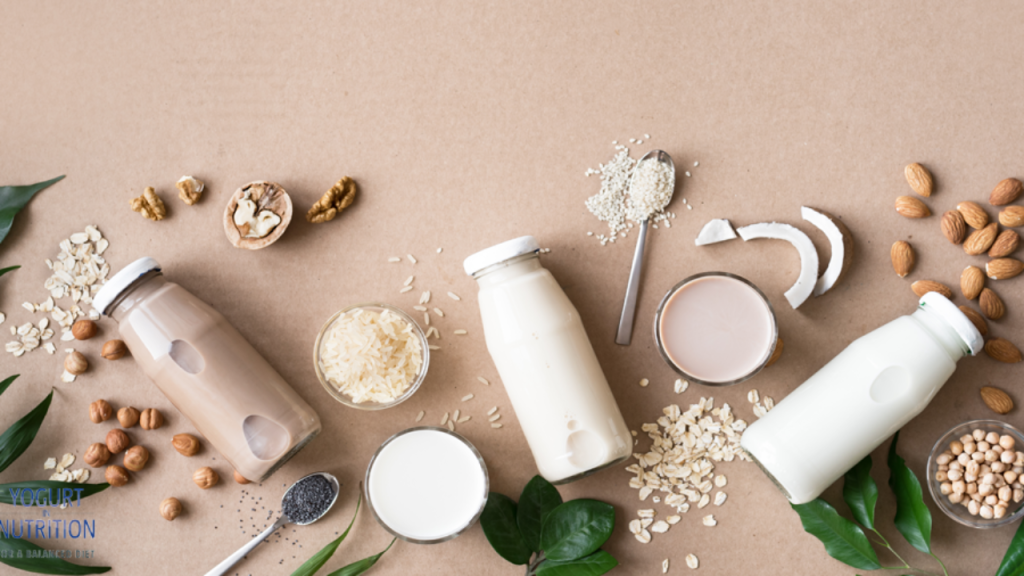In recent years, the popularity of plant-based diets has surged, driven by concerns for health, animal welfare, and environmental sustainability. As a result, there has been a growing demand for dairy alternatives made from plant-based ingredients. Whether you’re lactose intolerant, vegan, or simply looking to reduce your consumption of animal products, plant-based dairy alternatives offer a versatile and nutritious alternative to traditional dairy products. In this comprehensive guide, we’ll explore the wide range of plant-based dairy alternatives available on the market, from milk and yogurt to cheese and ice cream, helping you navigate the diverse landscape of plant-based options and make informed choices about incorporating them into your diet.
- The Rise of Plant-Based Diets:
The shift towards plant-based diets reflects a growing awareness of the health, ethical, and environmental implications of animal agriculture. Plant-based diets, which prioritize whole plant foods such as fruits, vegetables, grains, legumes, nuts, and seeds, have been associated with numerous health benefits, including reduced risk of chronic diseases such as heart disease, diabetes, and certain cancers. Additionally, plant-based diets are more sustainable and environmentally friendly than traditional animal-based diets, requiring fewer resources and generating fewer greenhouse gas emissions.
- Understanding Dairy Alternatives:
Dairy alternatives are products that mimic the taste, texture, and functionality of traditional dairy products without containing any animal-derived ingredients. These alternatives are typically made from plant-based ingredients such as nuts, seeds, grains, legumes, and coconuts. Dairy alternatives offer a wide range of options for individuals seeking to replace or reduce their consumption of dairy products due to health, ethical, or environmental reasons.
- Plant-Based Milk Alternatives:
One of the most popular categories of dairy alternatives is plant-based milk. Plant-based milks are made from a variety of ingredients, including almonds, soybeans, oats, rice, coconuts, and hemp seeds. Each type of plant-based milk offers its own unique flavor, texture, and nutritional profile. For example, almond milk is light and nutty, soy milk is creamy and versatile, oat milk is smooth and mildly sweet, and coconut milk is rich and indulgent. Plant-based milks can be used in place of dairy milk in cooking, baking, cereal, coffee, tea, and smoothies.
- Exploring Plant-Based Yogurt Alternatives:
Plant-based yogurt alternatives offer a creamy and tangy alternative to traditional dairy yogurt. These yogurts are typically made from ingredients such as soy, almonds, coconut, oats, or cashews, and are fermented with probiotic cultures to achieve a yogurt-like consistency and flavor. Plant-based yogurts come in a variety of flavors, including plain, vanilla, fruit, and savory, and can be enjoyed on their own, mixed with granola or fruit, or used as a substitute for dairy yogurt in recipes such as smoothies, parfaits, and dips.
- Discovering Plant-Based Cheese Alternatives:
Plant-based cheese alternatives have come a long way in recent years, offering a flavorful and meltable alternative to traditional dairy cheese. These cheeses are made from a variety of ingredients, including nuts, seeds, soybeans, and tapioca starch, and are often seasoned with herbs, spices, and nutritional yeast to mimic the taste and texture of dairy cheese. Plant-based cheeses come in a variety of styles, including slices, shreds, blocks, spreads, and sauces, and can be used in a wide range of dishes, including sandwiches, pizzas, salads, and pasta.
- Indulging in Plant-Based Ice Cream Alternatives:
Plant-based ice cream alternatives offer a creamy and indulgent alternative to traditional dairy ice cream. These ice creams are made from ingredients such as coconut milk, almond milk, soy milk, cashew milk, or oat milk, and are sweetened with natural sweeteners such as cane sugar, maple syrup, or agave nectar. Plant-based ice creams come in a variety of flavors, including classic favorites like chocolate, vanilla, and strawberry, as well as more adventurous flavors like salted caramel, cookie dough, and mint chocolate chip.
- Cooking and Baking with Plant-Based Alternatives:
Plant-based dairy alternatives can be used in a wide range of cooking and baking applications, offering versatility and flexibility in the kitchen. Plant-based milks can be used in place of dairy milk in recipes for pancakes, waffles, muffins, cakes, and sauces. Plant-based yogurts can be used as a creamy base for dressings, dips, marinades, and desserts. Plant-based cheeses can be melted, shredded, or grated and used in recipes such as grilled cheese sandwiches, quesadillas, lasagna, and macaroni and cheese. Plant-based ice creams can be enjoyed on their own or used to make milkshakes, sundaes, and ice cream sandwiches.
- Nutritional Considerations:
While plant-based dairy alternatives offer numerous benefits, it’s important to consider their nutritional profile when incorporating them into your diet. Some plant-based alternatives may be fortified with vitamins and minerals such as calcium, vitamin D, vitamin B12, and omega-3 fatty acids to mimic the nutritional content of dairy products. However, others may contain added sugars, preservatives, and stabilizers, so it’s important to read the ingredient list and choose products that align with your nutritional goals and preferences.
- Making Informed Choices:
When choosing plant-based dairy alternatives, it’s important to consider factors such as taste, texture, nutritional content, and sustainability. Experiment with different brands and varieties to find the ones that best suit your taste preferences and dietary needs. Look for products that are made from high-quality ingredients, free from artificial additives and preservatives, and produced using sustainable and ethical practices. By making informed choices, you can enjoy the delicious taste and health benefits of plant-based dairy alternatives while supporting your health, the environment, and animal welfare.
Plant-based dairy alternatives offer a delicious, nutritious, and sustainable alternative to traditional dairy products. Whether you’re lactose intolerant, vegan, or simply looking to reduce your consumption of animal products, plant-based alternatives provide a versatile and satisfying option for incorporating more plant-based foods into your diet. By exploring the diverse range of plant-based milk, yogurt, cheese, and ice cream alternatives available on the market and making informed choices based on taste, texture, nutritional content, and sustainability, you can enjoy the many benefits of plant-based eating while supporting your health, the environment, and animal welfare.
